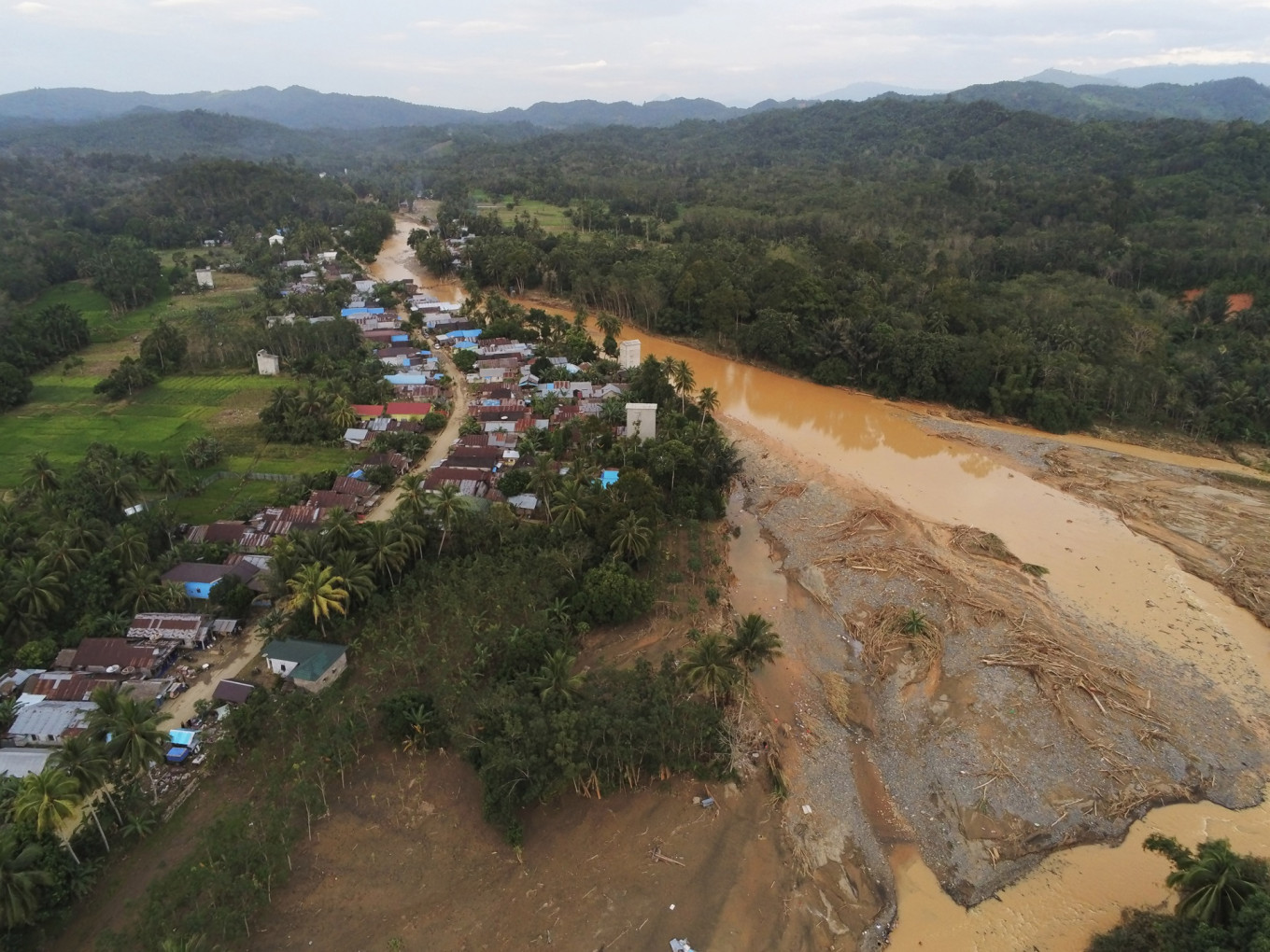Popular Reads
Top Results
Can't find what you're looking for?
View all search resultsPopular Reads
Top Results
Can't find what you're looking for?
View all search resultsKalimantan floods highlight environmental damage
Change text size
Gift Premium Articles
to Anyone
T
hree out of five provinces in Kalimantan have been hit by floods, triggered by deforestation and changing climate, over the past month, adding into the latest list of natural disasters that have struck the region this year.
West Kalimantan was the most severely affected by the recent flooding, with floodwater from the overflowing Kapuas River submerging tens of thousands of houses in seven out of 14 regencies in the province, namely Kapuas Hulu, Sintang, Melawi, Sekadau, Sanggau, Ketapang and Bengkayang.
In Sintang, the worst-hit regency, flooding has not still subsided after almost a month.
More than 220,000 people have been affected by the floods, with at least four fatalities recorded, according to the National Disaster Mitigation Agency (BNPB).
In Central Kalimantan, six regencies -- including the provincial capital, Palangkaraya – have been inundated since last week, affecting around 67,000 people.
Heavy downpours earlier this week has also caused flooding in at least three regencies in South Kalimantan, -- Balangan, South Hulu Sungai and Central Hulu Sungai -- affecting more than 14,200 people, destroying bridges and schools.
President Joko “Jokowi” Widodo has acknowledged that the flooding, particularly in West Kalimantan, was partly caused by environmental damage in the Kapuas River water-catchment area.
“[The flooding in West Kalimantan] was caused by damage in the catchment area that has been occurring over decades,” said Jokowi on Wednesday, adding, however, that rainfall that was “more extreme than the usual” also caused the flooding in the province.
He went on to say that the government planned to rehabilitate the damaged water-catchment areas, adding that that it was preparing to build a tree nursery next year in the initial step of its reforestation efforts.
Jokowi’s statement marked a significant departure from his remarks made in January, when he sought to downplay deforestation as the root cause of Kalimantan’s hydrometeorological disasters, saying that the flooding at the time was caused by a weather anomaly.
In the first month of this year, days of heavy rainfall led to massive flooding in South Kalimantan, killing at least 21 people and forcing more than 110,000 others to flee their homes.
According to Greenpeace Indonesia, around 53 percent of Kapuas's 9.3 million hectares of water-catchment area have been converted to oil palm plantations, leaving only 4.2 million ha of forest around the 1,100-kilometer river.
Central Kalimantan Governor Sugianto Sabran said that deforestation and major forest conversion to oil palm plantations had led to significant river sedimentation and caused many river streams in the province to disappear.
"There is even a palm oil concession that is allowed to manage up to 100,000 ha of plantation in Central Kalimantan. I don't think this should be allowed and the central government needs to review all palm oil permits that have been issued," he said on Wednesday as quoted by kompas.id.
Data from Global Forest Watch revealed that Kalimantan had lost around 4.1 million ha of primary forest – defined as forest that has not been completely cleared and regrown – between 2002 and 2020. Last year, the island’s primary forest area had shrunk by 121,000 ha, according to Global Forest Watch’s data.
Earlier this year, the government claimed success in reducing the loss of Indonesia’s forest area, with data from the Environment and Forestry Ministry showing that the country’s deforestation rate in 2019-2020 was the lowest in five years.
The floods have raised concerns that the government’s plan to relocate the capital from Jakarta to East Kalimantan will exacerbate Kalimantan’s environmental problems, with lawmakers recently voicing their concerns that the relocation plan could exacerbate deforestation issues on the island.
A report from World Resources Institute (WRI) Indonesia suggested that the government needed to clear a vast amount of intact forest and peatland to build the new capital city, which is set to occupy 256,000 ha of land that straddles North Penajam Paser and Kutai Kartanegara regencies.
"Building a new city as an administrative hub requires major infrastructure development, and it will be critical to do so without jeopardizing forests,” read the report, adding that the country’s forest areas were critical to mitigating harmful impacts from the climate crisis, which has already increased the risks of natural disasters such as floods and drought in the country.










